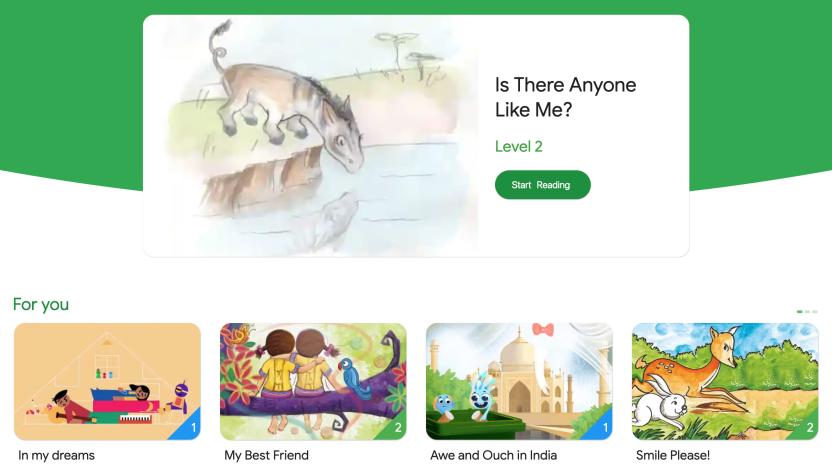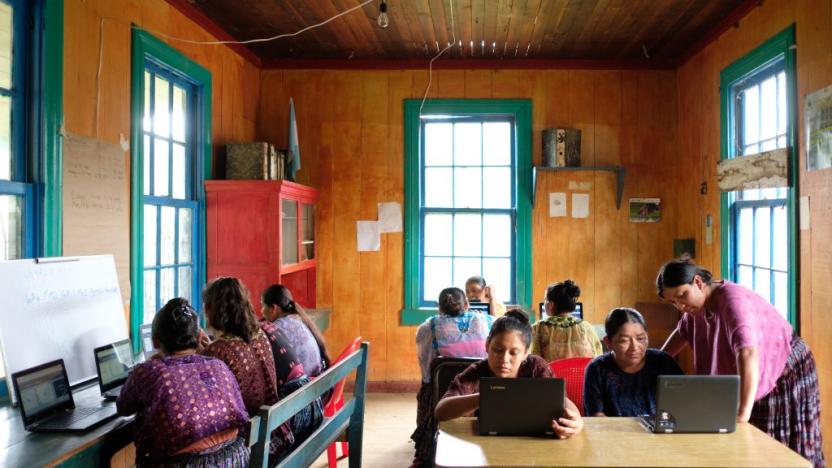literacy
Latest

Google's learn-to-read app for kids is now available on the web
Google can now help your kids learn to read on the web.

Google's learn-to-read app is now available in 180 countries
Read Along gives youngsters encouragement as they read stories aloud.

Microsoft's new literacy tool teaches language skills in a browser
Microsoft has partnered with the nonprofit organization CHOICE Humanitarian to release a browser-based digital literacy tool, called Accent, for underprivileged populations. It's designed specifically for Microsoft Edge so users can interact with its touchscreen mechanics, tracing out letters for kinaesthetic learning. Ideally, the tool will economically empower folks in undeveloped areas to seize opportunities in business and local government.

Researcher uses mobile phone data to predict illiteracy
Many non-profit orgs send out teams to teach people how to read and write, but a lot of them have very limited resources, as well. One Norwegian researcher, however, might have found a way to pinpoint places that are most in need of the organizations' help using people's mobile data. Pål Sundsøy used info from a phone company's survey of 76,000 mobile phone users in an unnamed developing country in Asia. That survey asked for each person's phone number and whether they can read or write.

Can technology solve America's literacy problem?
Roughly 36 million adults in the United States read English at or below a third-grade level. For a predominantly English-speaking country, that's a massive problem. Without an elementary knowledge of the language, this huge portion of the adult population faces a struggle to get by. Finding a job and generally progressing in a career is an obvious issue, but everyday tasks are also difficult. Understanding taxes, helping a child with homework, filling out health care forms or following instructions on medication; these are skills that anyone reading this article takes for granted, but many others toil over daily. We know the situation, but what's the solution? XPRIZE, an organization best known for its efforts to send private rovers to the moon and create a real-life Tricorder, has created a competition to prove that technology is the answer.

Xprize's next big challenge: software that lets kids teach themselves
The Xprize organization has inspired people to take on some pretty lofty goals, ranging from sequencing genomes to literal moonshots. Today, though, it's focusing on a very practical objective: improving education for hundreds of millions of kids. Its new Global Learning Xprize will offer a total of $15 million to teams that build open source, easily scaled software that lets young ones in developing countries teach themselves math, reading and writing. Anyone hoping to join in will have 18 months to craft their tools, which will be tested in at least 100 villages. The top five entrants will get $1 million each, while the winning entry will get a hefty $10 million. It may not be the flashiest competition, but it could go a long, long way toward tackling the chronic shortages of schools and teachers that ultimately hurt kids' futures. [Image credit: Saeed Khan/AFP/Getty Images]

Backers pledge over $1 million to bring Reading Rainbow to the web
Few things in this world are as moving as a potent mix of nostalgia and passion. Don't just take my word for it: just look at the more than 22,000 people who backed LeVar Burton's vision of bringing Reading Rainbow to the web on Kickstarter. That's more than a million dollars raised in less than a day, and it's all to help kids realize that theeeeeey can be anythiiiiiiiiing.

Found Footage: Project 2000 from 1988 on the direction of computing
This video has been around for quite a long time, but my guess is that you haven't seen it. It posits how future computers will used for education and literacy. Watching it you'll be taken by how much they got right and how other concepts got short shrift. One surprising thing is that it focuses almost totally on voice input and doesn't mention the concept of a touch screen interface. Instead it displays a trackball-type device with four buttons that doesn't presage multi-touch devices. A good deal of the footage was taken from 1987's Knowledge Navigator video which got a lot more play at the time. Project 2000 includes interviews with: Steve Wozniak on the start of computing in education and personal agents Diane Ravitch, the past director of the Encyclopedia Britannica, on using computers to motivate students and the challenges of adult literacy Alan Kay on computer simulation and visualization Alvin Toffler, most known as the author of Future Shock, on text translations Ray Bradbury on a variety of subjects The most talked about topic is hypermedia, the most integrated concept in modern computing and a major building block of the World Wide Web which was six years old at the time, however the WWW isn't mentioned. Oops my mistake. The World Wide Web starting with the Mosaic browser didn't happen until 1993. This is illuminative viewing and if you haven't seen it, I'd recommend you do so. The differences between what the speakers saw as the future and how things turned out is quite enlightening. Thanks Eric for sending this in.

American Library Association goes gaming
Today the American Library Association released its "Online Toolkit for Building Gaming @ Your Library" and with it, a 10-minute video walkthrough of the entire initiative (that we've included after the break). The ALA has been pushing various "gaming in libraries" initiatives over the course of the last two years and this new battle plan aims to bolster an already monumental effort. The toolkit is comprised of "resources, tips, and best practices" for aspiring libraries to join in the national push and hopes to inflate the current American literacy rate into the triple digits. Rather than simply adding various video games to a library's catalog, the toolkit emphasizes the use of games as a social medium -- championing a variety of board games old and new as well as the Nintendo DS and Playstation 3 in the aforementioned video. To be perfectly honest, considering the price of gaming coupled with that whole "global economic recession" thing we keep hearing so much about, heading out to the library for games sounds like a welcome change.

Ace Attorney cited as evidence against games as the enemy of reading
The Mirror recently posted an article positing games as the reason for a decline in reading. The "research" seemed to indicate that because a rise in video game playing was taking place at the same time as a perceived drop in reading time. But what if ... you read while playing? Like you do in every video game?In a Guardian blog entry, Trigger Happy author Stephen Poole discusses exactly that. You guys are aware of this, having actually played a video game (unlike most of the game "experts" that the mainstream media listens to) but games have lots of words in them. One specific example: the Phoenix Wright games, each of which "contains at least as much text as your average children's novel." For that matter, they are novels. Does reading not count when it's done on a screen? If anything, you're constantly tested on the information you've just read, meaning that a game like Phoenix Wright could significantly help with reading skill. If the games weren't about murders, that is. They aren't appropriate for the earliest readers, let's say.But The Legend of Zelda: Phantom Hourglass is entirely kid-friendly and jam-packed with text. As Poole says, "A child playing this game is probably more passionate about reading its prose for clues and taking detailed notes, than he is about doing his homework." Kids passionate about reading? But they should be reading instead!Poole sums up the post with a sentiment that is close to our own feelings: that literacy is not decreasing due to new technologies, but rather expanding into different and varied forms that aren't always on paper, and aren't always in the form of insulting children's literature.

Library lures potential readers with video games
Beware, bibliophobes! Nefarious librarians are luring gamers into their hallowed halls with promises of Guitar Hero goodness. The Fort Dodge Messenger reports that a public library in Humboldt, Iowa is using Guitar Hero as a hook to get teens interested in reading. Gaming aficionados from local schools were invited to the library to play the rhythm music game, and peers from the library's Teen Advisory Board used the opportunity to encourage reading as an enjoyable past-time. Books? Enjoyable? Who knew?[Via GamePolitics]

Illiterates can't play karaoke, what about other games?
From the BBC comes a report on how the sad state of literacy education in Britain affects something we all care about: Karaoke!Research from the Get On literacy campaign estimates that 17.8 million of the roughly 60 million people in Great Britain can't follow along to the quickly scrolling karaoke lyrics in songs like "I Will Survive" and "Mustang Sally." The situation might not be much better in America -- while over 99 percent of American adults are technically literate, up to 15 million Americans may be functionally illiterate and unable to process complex written sentences or math problems.Besides the obvious examples of games that rely on reading lyrics, there are many other games that might be completely inaccessible to these functionally illiterate populations. While many games these days feature full voice acting for every character, games like The Legend of Zelda: Twilight Princess still require a lot of reading to move the game and story along. Other games that rely on written puzzles or complex written instructions might be out-of-reach for millions of adults and children. Then again, these types of games can also provide great motivation for players to improve their reading skills in order to move on.Are game makers neglecting illiterate gamers by not including more accessible direction, or should basic reading skills be considered a prerequisite for gaming (as they are for living in a modern society)?[Via We Make Money Not Art]







